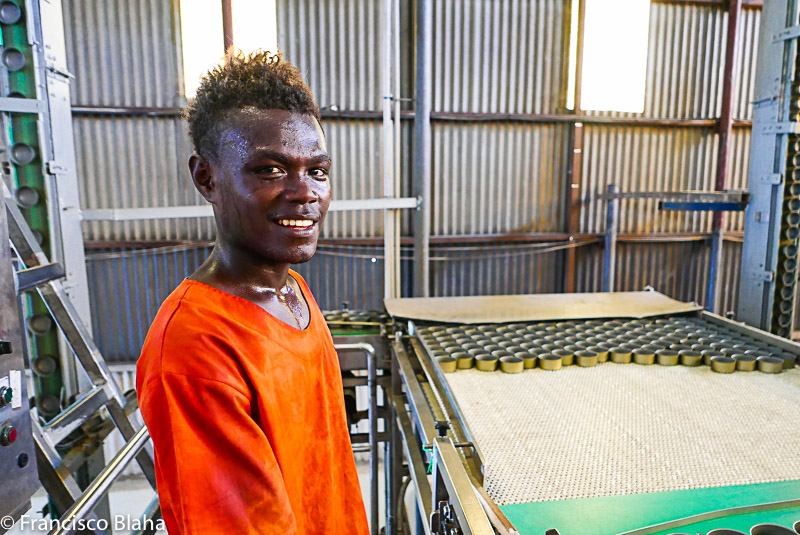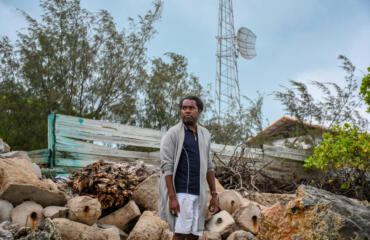Back in the early 1980s, in a success story of David versus Goliath proportions, Pacific Island nations and territories railed against some of the world’s biggest economies, holding them to account for pillaging their oceans.
The upshot was an agreement which not only increased Pacific profit from tuna – the region’s most valuable resource – ten-fold, but which also built one of the most sustainable tuna fisheries in the world.
But with major impacts of the climate crisis becoming increasingly explicit, Pacific countries now face another fight to safeguard the world’s largest tuna fishery and their income from this precious resource. A recent expert report documents how climate change will drive tuna from warming waters in the Pacific to cooler havens in the high seas, potentially crippling the region’s economies.
It predicts the tuna catch in the region will decline under current warming trajectories by an average of 20 per cent by 2050, costing up to $140 million annually, and reductions in government revenue of up to 17 percent for individual Pacific Island states.
The authors of the report – including representatives of the major fishing and technical agencies in the Pacific, as well as Conservation International and the University of Wollongong – are proposing a radical solution to secure climate justice.
Picking up on a suggestion initially floated by South Korea, one of the region’s biggest tuna customers, the report recommends that Pacific Island nations keep their historical rights to catches even when the tuna drift out of their jurisdictions. Rights would be negotiated via their regional fisheries management organisation, and the program would extend the region’s world-class vessel day scheme – designed to sustainably manage catches of target tuna species – to the high seas.
Such a mechanism would allow the region to maintain current income from major fishing customers, regardless of stocks moving out of traditional fisheries due to climate change. It’s the kind of pragmatic thinking which experts are looking to as a model for improving climate finance mechanisms, which are presently failing to deliver to some of the countries most vulnerable to climate change.

Crew members on a vessel in the Solomon Islands offloading their catch onto another vessel. Fisheries observers closely monitor vessels when they transfer their catch. This is one of many mechanims that help the Pacific ensure their fisheries remain healthy. Photo: Francisco Blaha
“The next step is figuring out what it’s going to take to get all the countries to come on board with South Korea, because if they do I think we’ve got a solution to the problem,” says Johann Bell, the report’s lead author, and senior director of Pacific tuna fisheries at Conservation International.
“If their revenues from fishing go down it would mean more grant aid from wealthy countries is needed to make up the shortfall,” he says.
“Why not empower the region, who already have an outstanding system of cooperative fisheries management, and let them manage the resource rather than leaving the region to fall into deficit and having to top that up with aid?”
The likelihood of tuna migrating to the high seas as oceans warm has long been recognised. But where previous research indicated that some Pacific Island countries would be the winners from the tuna’s migration, the latest analysis, published in the journal Nature Sustainability, indicates that all ten of the Pacific’s tuna dependent economies would suffer major losses. The report states it’s no longer a matter of ‘if’, but “when, how quickly and to what extent”.
The loss would be the gain of some countries most responsible for the climate crisis. The region’s biggest customers – including China, South Korea, US, and Japan – would be able to reap the benefit of catching more tuna on the high seas for free, which Global Fishing Watch claims are currently “virtually ungoverned open territory” and a “fishing free for all”.
Coral Pasisi, an earth scientist and expert in climate finance, argues this is a climate justice issue.
“Small Island Developing States in the Pacific that have not created climate change, yet they stand to lose [a large portion of the] revenue that they depend on for funding schools and healthcare because of an issue that someone else has caused.”
Fishing fees paid by industrial fleets to gain access to waters in the Western and Central Pacific region presently account for an average of 37 per cent of all Pacific Island state’s government revenue. This ranges from 4 percent of government revenue for the relatively large economy of Papua New Guinea to 84 percent for Tokelau.
First and foremost, the analysis stresses the urgent need for the world to haul back emissions to halt warming at 1.5 degrees above pre-industrial levels to avoid the worst impacts of tuna re-distribution. But with COP26 seen as the “best, last chance” to keep warming inside that ceiling, Dr Bell argues it’s important to explore a back-up plan.

A woman awaits customers on a fishing vessel to sell her produce in Rabaul, Papua New Guinea. The report also predicts that climate change will result in a greater proportion of tuna needed for local communities. This will further limit the region’s income from the major fishing economies. Photo: Francisco Blaha
Negotiating a deal to maintain the economic value of tuna regardless of climate change’s impacts will likely not be a one size fits all solution across the Pacific, and is an option that is still to be discussed among the region, says Ms Pasisi.
The idea also raises important questions for COP26 negotiations on how climate finance could be delivered more equitably, she argues. Little climate financing has been unlocked for the Pacific so far due to challenges accessing it, pointing to a missing piece of the puzzle that is needed to make climate finance mechanisms more appropriate for small island states.
She believes the idea to guarantee tuna income to Pacific economies along the lines being proposed provides “an example of a way in which climate finance could be well delivered to small island developing states based on the science that we know”.
Currently, climate finance is largely delivered via the UN’s Green Climate Fund, a critical element of the 2015 Paris Agreement in which wealthy countries including Australia committed to help developing countries financially to achieve their climate goals. Prime Minister Scott Morrison announced in 2018 that Australia would stop “throwing money” into the fund.
Numerous hurdles involved in accessing climate finance have meant that many smaller states in the Pacific don’t have the capacity to unlock the money or, where they can, set the priorities on how funds are spent, Ms Pasisi says.

A worker at a tuna loining and canning processor in Noro, Solomon Islands. The company is the largest employer in Noro. Photo: Francisco Blaha
Expanding the terms of what constitutes official climate finance and how the mechanisms work and might be refined would need to be negotiated during the Glasgow COP26, she said.
The issue of climate finance is expected to weigh heavily on the summit, with an OECD report released this week finding climate finance has fallen short of the goal set in 2009 of delivering at least $100 billion a year to the developing world countries by 2020. Further, much of the finance delivered so far has gone to middle-income countries to help them cut green-house gas emissions.
“If you had a tanker and it banged into my island and spilled oil all over my coastline, and all the fish that we would normally depend on suddenly aren’t there anymore, there are ways in which you know the polluter is brought to justice and provides compensation for this big impact to the country,” Ms Pasisi says from her home in Niue.
“Climate change is exactly the same, it’s just harder, because everyone is polluting, no one’s willing to pay compensation for it in a collective manner.”

A fisheries observer and a fishing vessel’s captain in the Marshall Islands. Photo: Francisco Blaha



